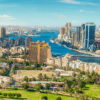Egypt’s hot climate presents unique challenges when it comes to staying hydrated, especially during the sweltering summer months. The importance of proper hydration cannot be overstated, as it plays a vital role in maintaining overall health and wellness. In Egypt’s arid environment, the body works overtime to regulate temperature, making it essential for individuals to stay vigilant about their water intake to avoid dehydration-related risks, such as dizziness, fatigue, and heat stroke.
With temperatures often soaring above 40°C, residents and visitors alike must devise strategies to remain hydrated and cool throughout the day. The key is to make a conscious effort to consume an adequate amount of water and other hydrating beverages before thirst sets in. Understanding the effects of heat on the body and being able to recognize the early signs of dehydration are essential for enjoying a safe and pleasant experience in Egypt’s sun-soaked landscape.
In this article, we will explore various tips and tricks for staying hydrated in Egypt’s hot climate. By implementing these simple practices, individuals can effectively maintain their bodily functions, energy levels, and overall well-being during the relentless summer heat.
Understanding Hydration and Its Significance
Effects of Dehydration in Hot Climates
Dehydration can have serious consequences on the human body, especially in hot climates like Egypt. When environmental temperatures rise, the body is susceptible to losing water and electrolytes through sweating. This process helps to maintain an optimal body temperature, but it can lead to dehydration if fluid losses are not adequately replaced.
The effects of dehydration can include:
- Fatigue
- Dizziness
- Headaches
- Muscle cramps
- Heat exhaustion or heat stroke
In hot climates such as Egypt, the risk of severe dehydration increases due to the higher temperatures and intense sun exposure.
Hydration and Human Body Function
Proper hydration plays a vital role in ensuring the body functions efficiently. Water is involved in a wide range of physiological processes, including:
- Temperature regulation
- Nutrient transportation
- Waste elimination
- Joint lubrication
- Maintenance of skin health
Maintaining adequate hydration in a hot climate like Egypt is essential for supporting these bodily functions and overall health. One study found that hydration can significantly influence skin health, neurological function, gastrointestinal and renal functions, and body weight management.
Common tips to ensure proper hydration include:
- Drinking water regularly throughout the day
- Consuming foods high in water content, such as fruits and vegetables
- Limiting caffeine and alcohol intake as they can dehydrate the body
- Monitoring urine color as a quick indicator of hydration levels (pale, straw-colored urine indicates proper hydration)
Being aware of the importance of hydration is crucial for maintaining health and well-being, especially in hot climates like Egypt’s summer months. By understanding the effects of dehydration and the role hydration plays in human body function, individuals can take preventive measures to ensure they remain hydrated.
Practical Hydration Tips for Egypt’s Summer
Scheduling Fluid Intake
In Egypt’s hot climate, it is crucial to plan your fluid intake throughout the day. Start your day with a glass of water, and aim to drink at least 2 liters of water spread evenly over the day. It is advisable to sip water consistently rather than waiting to feel thirsty, which can be a sign of dehydration. After engaging in physical activities or spending time in the sun, make sure to replenish your body with fluids to avoid dehydration.
Choosing Hydration Sources
Staying hydrated is not only about drinking water. It is also important to consume other fluids that contribute to your hydration in a healthy way. Consider incorporating beverages like tamarind juice and carob juice, which are known to have a cooling effect and are popular in Egypt during the summer months. Consuming coffee and tea also contributes to hydration, but make sure to opt for sugar-free options and limit the use of cream.
Remember to eat water-rich foods like fruits and vegetables, such as watermelon, cucumbers, and oranges. These can be a delicious and refreshing way to help you stay hydrated.
Recognizing Dehydration Symptoms
Being able to identify early signs of dehydration is crucial, especially when exposure to Egypt’s summer heat is inevitable. Familiarize yourself with common dehydration symptoms, which include:
- Dizziness
- Fatigue
- Dry mouth
- Dark yellow urine
- Headaches
If you experience any of these symptoms, it may indicate that you need to drink more water. Prioritize your hydration to ensure a safe and enjoyable time in Egypt during the hot summer months.




